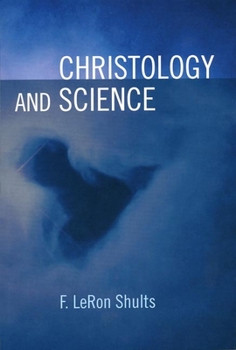Christology and Science
Select Format
Select Condition 
Book Overview
F. LeRon Shults here breaks new ground by explicitly bringing specific themes of Christology -- Incarnation, Atonement, and Parousia -- into dialogue with contemporary science -- evolutionary biology, cultural anthropology, and physical cosmology. Shults skillfully summarizes some of the popular constructive responses to these developments, offering a unique organization around three concrete case studies. After clarifying the way in which Christian...
Format:Paperback
Language:English
ISBN:0802862489
ISBN13:9780802862488
Release Date:June 2008
Publisher:William B. Eerdmans Publishing Company
Length:181 Pages
Weight:0.78 lbs.
Dimensions:0.5" x 6.3" x 9.2"
Customer Reviews
3 ratings
Resourceful and Challenging - An Accomplished Interdisciplinary Exercise
Published by Thriftbooks.com User , 15 years ago
REVIEW: LeRon Shults has provided a book that is resourceful and challenging for those serious about theology, and especially enjoyable for those with an interest in science. This book offers awareness of the hermeneutical challenges involved in understanding Christological doctrine in conversation with contemporary science. His careful articulation of the reconstructive task of Christology reveals a refreshing philosophical depth. Moreover, his exposition of the sciences are as interesting as they are relevant. In the first chapter, Shults addresses the issues involved with reforming Christology. In the following three chapters, he outlines categories that have historically shaped discourses regarding the incarnation (chapter 2), atonement (chapter 3), and parousia (chapter 4) of Christ. In each of these chapters he also puts forth reconstructive proposals from various scholars conversant with the relevant fields of study (evolutionary science, cultural anthropology, and physical cosmology). What I like most about this book: In illuminating how inherited philosophical and scientific categories informs our assumptions and conditions traditional doctrinal formulations, this book demonstrates that theology and science are already mutually conditioning. This insight should preclude any question as to whether science and theology SHOULD interact, as it is the case that they are inescapably intertwined within our interpretive framework. The appropriate question then is how to have an interdisciplinary dialogue while being intentional about this inescapable relationship. This book will be especially helpful to theology students in understanding contemporary theological discourse and anyone interested in the dialogue between theology and science. OUTLINE/SUMMERY: Chapter 1, "Reforming Christology", addresses the ongoing task of articulating the significance of Jesus Christ in a way that is plausible and compelling within each cultural context, and then outlines some immediate challenges of this task in our contemporary setting. "Many traditional depictions of the person, work and coming of Christ are shaped by assumptions about humanity and the world that no longer make sense in light of contemporary science" (pg 1). A better understanding of Christology involves an interdisciplinary mediation between Christology, science, and philosophy. Philosophy of science addresses the question of whether knowledge of Christ is legitimate knowledge. Philosophy addresses the questions of what methodology and assumptions are appropriate in studying (the "science" of) Jesus Christ. Finally, Christology addresses the question of how Jesus' way of knowing should guide our inquiries. Chapter 2, "Incarnation and Evolutionary Biology", seeks to articulate the challenge of the reconstructive task as it applies to the doctrine of incarnation in light of contemporary "evolutionary science", drawing from Darwinian evolution, neuroscience, and pal
Wide ranging, yet concise work
Published by Thriftbooks.com User , 16 years ago
In his latest effort in reforming Christian theology in dialogue with contemporary scientific and philosophical perspectives, LeRon Shults focuses on Christology in light of science (broadly concieved). The book is structured similarly to Shults' "Reforming" though is significantly more brief. In three case studies, Shults explores a particular area of interdisciplinary interest, narrows the focus into specific philosophical challenges, highlights the work of a few relevant thinkers, and rounds off each case study with his own perspective. Shults covers an astonishing amount of ground (who else can explain and critique John Milbank in five sentences?) without leaving the reader behind. He is at his best when he explores the often-overlooked philosophical and metaphysical commitments involved in traditional theological explanations of incarnation, atonement, and parousia. This book is essential reading for all who think Christological formulations need reforming, but who desire to preserve the intuitions of previous efforts. Shults indeed challenges some cherished Christian positions, but without the self-styled radicality of a John Shelby Spong. He does not dispense with Christian orthodoxy, but expresses it in reformative ways. My main criticism of the book is the brevity of Shult's summary/constructive section at the end of each case study. He covers various issues, perspectives, and proposals in earlier parts of the chapter and it is not always clear what he wants to bring forward into his own analysis. For instance, in the section on parousia, Shults says, "Even if we are critical of the methodological and metaphysical assumptions that guide some of these interdisciplinary proposals, we can appreciate..." (p. 143), but does not offer any actual criticisms. This is consistent with the book's presentation not as a final or complete perspective, but as a gesture toward further possibilities.
Fantastic!
Published by Thriftbooks.com User , 16 years ago
Another classic work from LeRon. Full of great insight and cross discipline synthesis. Hopefully it'll find it's way into classrooms, lecture halls and other places of discusssion. [...]






